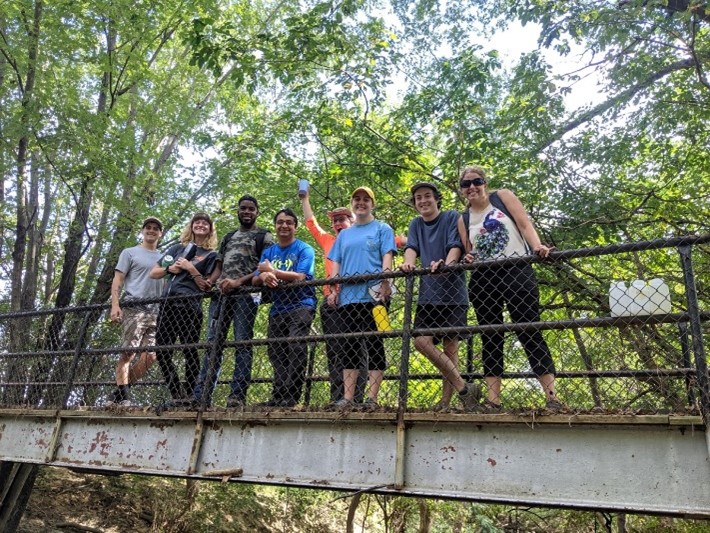

Written by: Gabriel Parks
A passionate expert in hydrology (the scientific study of water), Sarah Praskievicz, Ph.D. is an accomplished Associate Professor and researcher at UNC Greensboro. Hailing from the woods of rural Maine, Dr. Praskievicz grew up without secure access to running water, but with an active appreciation for the outdoors and for the integral role water plays in nature. Her formative experiences growing up led her to dive deep into scientific studies of water resources and the relationships between human affairs and nature. She completed her Ph.D. in Geography at the University of Oregon, with a dissertation centered on Climate Change.
For over a decade, Dr. Praskievicz has merged her research with her joy and concern for the outdoors. She continues to bring members of the Greensboro community and beyond together to engage with nature and our human impacts on it from a social and environmental justice perspective. When she is not traveling for research or leading various teams to engage the environment across the nation and the world, she can be found enjoying writing, photography, cooking, and playing the ukulele.
Current Projects in the Praskievicz Lab

- Urban Streams Outreach
Through this project, Dr. Praskievicz leads undergraduate students in her Water Planet course to do physical-habitat assessments and water-quality monitoring across Greensboro streams and rivers. She also partners with the Piedmont Conservation Council to provide data for sites on North Buffalo Creek, where stream-enhancement projects are being implemented. Another partner is UNCG’s Center for Housing and Community Studies, with whom she monitors a tributary of South Buffalo Creek, a site in an environmental justice community. This project engages communities to confront natural and socioeconomic risks to Greensboro and builds a crucially needed social-environmental justice presence in the area.
- Debris Flows
Dr. Praskievicz is creating new ways to better understand the effects of debris flows—fast, often dangerous, moving masses of water-saturated sediment—in areas impacted by wildfires. According to Dr. Praskievicz, where current scientific models can help predict the likelihood of debris flows, they do not help show where the flows will end up going. As she says: “ A better understanding of post-wildfire debris-flow runout can help in managing the risk of these hazardous events.” This project holds national relevance, especially for helping improve the information the US Geological Survey has for reducing the risks of these wild events.
- Fog interception in the Southeastern United States
According to Dr. Praskievicz, fog interception occurs when water droplets suspended in the air are captured by vegetation, impacting how water affects different natural areas. Currently, Dr. Praskievicz studies the activity of water in Spruce-fir forests of the Southern Appalachian region. Specifically, she conducts field measurements in spruce-fir and northern hardwood species in the Great Smoky Mountains National Park. The Southeast is an understudied area in Praskievicz’s field, and this research helps highlight issues and concerns pertinent to this region as well as across the United States.
Selected Publications from the Praskievicz Lab and Websites
Check out Dr. Praskievicz’s Google Scholar profile
Some of Dr. Praskievicz’s most recent publications:
Buege*, E., P. Esselman, and S. Praskievicz. 2020. Hydrogeomorphological controls on reach-scale distributions of cichlid nesting sites in a small Central American river. Ecology of Freshwater Fish, in press. DOI: 10.1111/eff.12580
Praskievicz, S., and C. Luo*. 2020. Environmental instream flows to support physical habitat for freshwater biodiversity in Alabama’s rivers. Southeastern Naturalist 19:717-741. DOI: 10.1656/058.019.0410